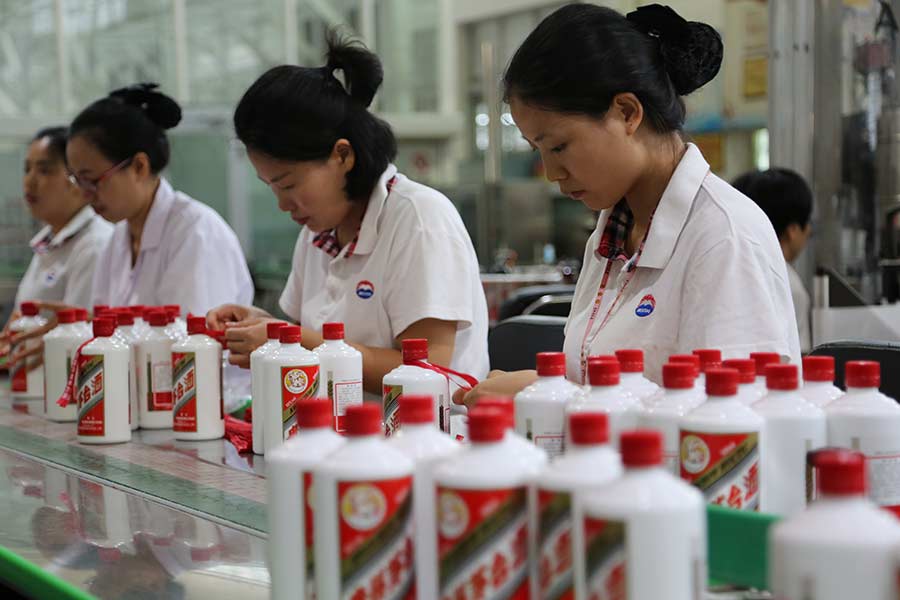China's consumption upgrade to boost product, service quality


China's ongoing consumption upgrade has made it imperative for companies to improve the quality of their products and services, said participants at a recent global conference.
"Improved quality and services are key to consumption upgrading," said Li Baofang, chairman of Chinese liquor firm Kweichow Moutai Co, adding that his company has been at the forefront of providing better services to customers.
Li's comments came during a panel discussion on Consumption: Upgrading or Downgrading, during the Boao Forum for Asia Annual Conference 2019 in South China's Hainan province.
Moutai closed 2018 with a net profit of 35.2 billion yuan ($5.2 billion), up 30 percent from the same period in 2017. Its market value has exceeded 1 trillion yuan in the past two weeks, Li said, adding that the company's stock appreciation is a direct reflection of the consumption upgrade in China.
Li said Moutai will add another 6,000 metric tons of production capacity by the end of this year to have an annual capacity of 56,000 tons. "After that we will halt capacity expansion for a long period, so as to minimize the harmful impact on the environment," he said.
Wang Junzhou, president of Chinese home appliance retailer Gome Retail Holdings, believes that companies are entering a new era where the focus is no longer restricted to bridging the market gap, but to upgrades of existing appliances.
"Smart home environment is one of the most evident changes brought by the forthcoming era of 5G," said Wang. "The smart home solution, formed by artificial intelligence, voice recognition and deep learning technologies, is a typical example of consumption upgrade."
Content upgrade is important, especially for the culture sector as well as the film and TV industry, said Wang Zhonglei, co-founder, vice-chairman and CEO of Huayi Brothers Media Corp.
China has become the world's second-largest film market, with the average annual frequency of cinema visits per person increasing significantly from 0.1 times to 2 times over the past decade, said Wang, adding the number of movies produced annually in China has risen from 100 to 1,000 during the same period.
"This was partly driven by the development of the internet as it has inculcated a passion for movies in many people, but we need to upgrade technology to support sustainable development," said Wang.
Robert Aspell, president of Cargill Asia-Pacific and managing director of Cargill Agricultural Supply Chain Asia, said the 150-year-old company started to invest in China 40 years ago, and has witnessed the country's consumption upgrading as well as industry upgrading.
"Small farmers growing vegetables are doing business on WeChat now," Aspell said, adding that sustainability is important for doing business. Asia needs to keep its doors open for trade within as well as with the rest of the world, he said.
Online shopping by Chinese consumers is playing a big role in the evolution of US food company Mars Inc, said Andy Pharoah, the company's senior vice-president, adding that more than 50 percent of its pet food sales in China comes from online platforms.
"China sales account for 6 percent of our total revenue, and we hope to increase the figure to 15 percent in the near future," said Pharoah, adding that consumers are evolving with individual demands.
"Consumers are asking for much more now," said Wilfred Wong, president and executive director of Sands China, an integrated resort developer and operator in Macao and a subsidiary of Las Vegas Sands Corp.
In Sands China's projects, casinos take up just 4 percent of the total area, with the rest being developed as hotel rooms, restaurants and entertainment facilities, said Wong, adding the industry needs to provide more personalized and one-stop services.
Considering the rapid growth of the Chinese economy, together with the per capita disposable income, it is imperative that consumption upgrade occurs, said Wang Ran, founder and CEO of CEC Capital Group, a leading private investment bank.
"Consumption downgrade is more relative as it is just about a certain period of time or a certain group of people," said Wang.
"People aged under 35 will account for 67 percent of China's consumer market by 2021," said Wang. "The Generation Z, or the post-'95s ... will bring more changes (to the market) that will lead to the emergence of new consumer experiences, scenarios and brands."




































